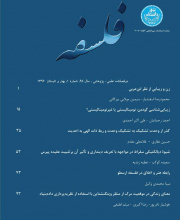
مقالات
حوزه های تخصصی:
In this paper I explore surprising parallels in the arguments between dualists and materialists in the philosophy of mind in India and the West. In particular, I compare the Nyaya School of India with Cartesian dualism and its Western defenders and the Carvaka School of India with contemporary Western materialists.
Priscianus of Lydia at the Sasanian Court: Solutionum ad Chosroem
حوزه های تخصصی:
Priscianus of Lydia’s Solutionum ad Chosroem is a series of answers to questions asked at a philosophical debate held at the Sasanian court c. 530 CE. Priscianus of Lydia was one of seven non-Christian philosophers from the Byzantine Empire who journeyed to the Sasanian Empire to take part in the debate. Long overlooked in the history of philosophy, Priscianus of Lydia’s text represents a branch of Neoplatonism that survived for centuries uninfluenced by the official Christianization of the Roman Empire. Priscianus of Lydia was one of the last remaining representatives of non-Christian Neoplatonism in Late Antiquity. Solutionum ad Chosroem provides a record of the world of Neoplatonism shortly before it disappeared under a tide of officially Christian philosophy and theology. I discusses the context of Priscianus’ work and its relation to activities in the Byzantine Empire, such as Emperor Justinians suppression of paganism and the closing of the Academy in Athens in 529 CE. I also discuss the specific contents of the Solutionum ad Chosroem, including questions on first principles, generation, natural history, and the relationship between the soul and the body.
Zarathrustrian Mind: Some Comparative Reflections on the Philosophy of Zarathrustra
حوزه های تخصصی:
This paper deals with an essential problem which the modern western thinker faced with and tried to find a solution for that in the benefit of modern humanity. This problem is human reason and his free mind. The author tries here to go back to Zarathrustrian concept of mind and bring forth some fresh reflections in a comparative way. This will let him to evaluate in the main the view that argues for the difference between the Asiatic concept of free mind and the Western concept of free mind. Some reflections and conclusions of the author here should be taken in the light of this evaluation.
Love (Mohabba) in Sufism
حوزه های تخصصی:
In the following, I describe the Sufi Path (tariqa) as a dialectical process which transforms the person through love. I examine the belief system of Islamic mystics as a journey involving both creativity and passion. I do so by using a fresh approach, a perspective that has heretofore yet to be applied to the spiritual alchemy of the Sufis.
The Feminine vs. the Masculine : A Sufi Perspective of Life
حوزه های تخصصی:
In Sufism, one may find a very interesting feminine approach according to which the feminine is the source of life. Though it is roughly distinguished from modern feminism in principle and aim, it would be very critical to see how this perspective overcomes the masculine dominated world. The overall aim of this paper is to give only a remark and an entry to this perspective without involving in its implications.
Morality, Rationality and Impartiality
حوزه های تخصصی:
Morality as somehow involving rationality and impartiality received classic expression in philosophy of Kant who frankly speaks of “rational and impartial spectator” in contemplating the universal law. The overall aim of this paper is to show (1) that the idea of morality implies rationality and this will be reached at in refuting the moral scepticism; but (2) it does not necessarily indicates impartiality, since the justification of the principle of impartiality does not solve the problem of justifying particular moral principles. I will start with the question “Why should we be moral?” and then turn to moral rationality to refute moral scepticism, finally the relationship between rational morality and the principle of impartiality will be reconsidered.